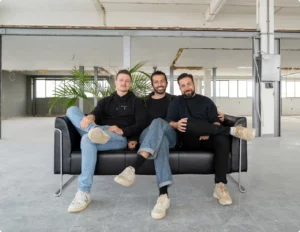Why do Media Companies Invest in Your Blockchain Startup, Ingo Rübe?

Polkadot is one of the rising stars of 2020 in the block chain sector. The DOT token has recently become one of the most important crypto assets in the world in terms of market capitalization. The Berlin startup BOTLabs is one of the first companies to rely on polkadot and wants to offer an alternative to the ERC-20 token of the Ethereum network with Polimec.
Ingo is the founder and CEO of BOTLabs, the company that develops KILT Protocol. The Computer Scientist founded his first IT startup in 1995 and later, as CTO of Hubert Burda Media, he initiated the open-source CMS Thunder. In this interview, he explains the plans with Polkadot and Polimec – and why media companies invested in his startup.
Trending Topics: BOTLabs is the startup behind KILT Protocol. What are the goals that your team wants to achieve?
Ingo Rübe: We build blockchain infrastructure for verifiable credentials. That’s basically the layer on which machine identities are issued and presented. This is a very important building block for the digitization of industries. BOTLabs strives to build bridges between the Blockchain world and traditional industries.
Last week, you launched a new fundraising mechanism for the Polkadot ecosystem, called Polimec. How does it work?
You can think of it like the ERC0 mechanism for the Polkadot world. Polimec is a blockchain, which enables issuing new crypto currencies and making them transferable.The Polkadot ecosystem desperately needs such a mechanism. And this includes us, the KILT Protocol.
You are trying to establish an alternative for ERC-20 tokens that are based on Ethereum. What’s wrong with ERC-20 tokens, and what can you do better?
ERC-20 is great. It made it really easy to launch crypto currencies and thousands of projects used this mechanism. But the system also shows some issues, we tried to repair in Polimec. The most important difference is obviously: Polimec is not a Smart Contract. It is a solitary single-purpose blockchain.
This is also the difference between the Ethereum Ecosystem and the Polkadot Ecosystem. While in Ethereum there is only one blockchain and all the applications are Smart Contracts, we now have the chance to build a new blockchain with a single purpose. Apart from being more scalable this also provides the chance to individually design the blockchain for its very purpose. In the case of Polimec this leads to some advantages over ERC20
For transferring an ERC-20 based token, one has to always fuel the ERC-20 contract with gas. That means, if you want to send an ERC-20 token, you always have to attach some ETH to it. For small transfers this can mean that you have to pay more fee than you actually transfer. In Polimec the gas is paid in the currency, which is actually transferred.
ERC-20 was not curated. Anyone can produce an ERC-20 in less than one hour. That made it very easy to produce coins for non-promising or even fraudulent projects. In Polimec the issuers are also the maintainers (miners) of the blockchain. Consequently the issuers of the coins decide who is allowed to join their club. As the existing issuers would have to share their income with the new issuer, they will only accept the coin, if they are interested in earning it. A community of promising projects evolves.
Will Polimec support STOs and IEOs?
Polimec is currently designed for utility tokens. But Polimec is a community effort and further development is decided by the community. If security tokens are needed within the Polkadot Ecosystem, Polimec will evolve. IEO support is already planned. In fact it is quite easy. The issuers transfers the IEO total to the exchange’s Polimec balance and the exchange then lists the coin and transfers it to all the buyers in the IEO.
Why did BOTLabs choose Polkadot as a platform to build on? What are the advantages over Ethereum or EOS?
When you build verifiable credentials for industrial purposes you encounter a dilemma: On the one hand, the validity of the credentials must be stored fully decentralized. Otherwise one company or group would accumulate far too much power. On the other hand these credentials will be used for IoT devices, which are often very cheap. The first requirement calls for a permissionless blockchain like Ethereum, but the second requirement excludes permissionless blockchains, because the gas price cannot be predicted and no one would like to pay $25 for a credential and then attach it to a $2 device.
Moving to permissioned blockchains is also not the solution, because they are not fully decentralized. The only solution to this dilemma is Polkadot: it connects fast and cheap-running permissioned blockchains to a permissionless fully decentralized system. This is why we decided to join the Polkadot ecosystem already in 2018. I still believe it’s the only way to provide industrial scale pricing together with bank level security in a trustless environment.
BOTLabs’ main product is the KILT Protocol. What is it made for, and how does it work?
KILT makes digital, verifiable, revocable and anonymous credentials. This is very close to a digital type of passport. But we are not here to replace passports. That would be quite stupid, because passports actually work. And no one replaces a simple working system with a complicated technology. We are looking at the digitization of industry. This requires machine identity for cloud services, which want to prove to users or other services for example that they are GDPR compliant or compatible with some standard. Also IoT devices have to prove compliance a lot. In fact this is a much bigger market that passports and desperately needed by industry.
BOTLabs’ investors are Ringier and Burda, two of Europe’s biggest media companies. Why was your startup interesting especially for these media companies?
Burda and Ringier are media houses and thus victims of the Web2. The centralization of the internet excluded media houses from revenue streams and funneled them towards Facebook and some other big enterprises. This is the reason why media companies are very much interested in helping the next version of the Web to evolve. KILT is an essential part of the Web3 movement and supporting this movement is the right step for media companies.





























